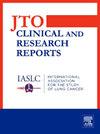支气管镜下低温免疫治疗晚期NSCLC的I期剂量递增临床试验
IF 3.5
Q2 ONCOLOGY
引用次数: 0
摘要
NSCLC的预后仍然不理想。最近的研究表明,冷冻消融术可以产生抗肿瘤的免疫作用。在这项首次人体I期临床试验中,我们调查了在标准支气管镜检查期间进行支气管镜冷冻免疫治疗(BCI)的安全性和可行性,并探讨了相关的全身免疫反应。方法招募已知或疑似晚期非小细胞肺癌的受试者。BCI以剂量递增的冻融循环递送,以确定最大剂量耐受。可行性评估确定了一个预先设定的目标,即在超过或等于80%的受试者中实现成功的脑机接口。安全性通过bci相关并发症评估,包括2 - 3级出血、需要干预的气胸,以及国家癌症研究所不良事件通用术语标准3 - 5级不良事件。收集脑损伤前和脑损伤后的血液样本,以探讨全身免疫谱的变化。结果研究对象主要为临床TNM 3期或4期腺癌或鳞状细胞癌。我们达到了30秒的最大剂量,100%的可行性,没有脑接口相关的不良事件。在外周血分析中,我们观察到与低剂量BCI组相比,高剂量BCI组衍生中性粒细胞与淋巴细胞比率显著降低。我们还观察到脑损伤后炎症细胞因子- gm - csf、IFN-γ、IL-1β、IL-17A和il -2以及效应记忆T细胞的增加。结论脑机接口是安全可行的。此外,我们提供的初步证据表明,在较高剂量水平下,存在与细胞毒性相符的全身免疫反应。进一步的免疫分析将确定BCI与免疫检查点抑制联合作为非小细胞肺癌治疗辅助疗法的潜力。本文章由计算机程序翻译,如有差异,请以英文原文为准。
A Phase I Dose-Escalation Clinical Trial of Bronchoscopic Cryoimmunotherapy in Advanced-Stage NSCLC
Introduction
Outcomes for NSCLC remain suboptimal. Recent data suggest that cryoablation can generate antitumor immune effects. In this first-in-human phase I clinical trial, we investigated the safety and feasibility of bronchoscopic cryoimmunotherapy (BCI) delivered during standard-of-care bronchoscopy and explored associated systemic immune responses.
Methods
Subjects with known or suspected advanced-stage NSCLC were recruited. BCI was delivered in dose-escalated freeze-thaw cycles to determine maximum dose tolerance. Feasibility assessment was determined with a pre-set goal of achieving successful BCI in more than or equal to 80% of subjects. Safety was assessed by review of BCI-related complications, including grades 2 to 3 bleeding, pneumothorax requiring intervention, and National Cancer Institute Common Terminology Criteria for Adverse Events grade 3 to 5 adverse events. Pre- and post-BCI blood samples were collected to explore changes in the systemic immune profile.
Results
Subjects with predominantly clinical TNM stage 3 or 4 adenocarcinoma or squamous cell carcinoma were enrolled. We reached the maximum dose of 30 seconds with 100% feasibility and no BCI-related adverse events. In peripheral blood analysis, we observed a significant decrease in derived neutrophil-to-lymphocyte ratio in the high-dose BCI group in comparison to the low-dose BCI cohort. We also observed increases in inflammatory cytokines—GM-CSF, IFN-γ, IL-1β, IL-17A, and IL-2—and effector memory T cells post-BCI.
Conclusion
BCI is safe and feasible. In addition, we provide preliminary evidence that at higher dose levels there is a systemic immune response consistent with a cytotoxic profile. Further immune analyses will determine the potential of BCI as an adjunctive therapy in combination with immune checkpoint inhibition in NSCLC treatment.
求助全文
通过发布文献求助,成功后即可免费获取论文全文。
去求助
来源期刊

JTO Clinical and Research Reports
Medicine-Oncology
CiteScore
4.20
自引率
0.00%
发文量
145
审稿时长
19 weeks
 求助内容:
求助内容: 应助结果提醒方式:
应助结果提醒方式:


